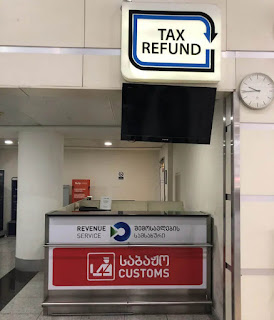Tbilisi, Georgia
Tbilisi, Georgia is great for vegans, wine lovers and walkers. The city is decadently romantic, like a mini-Paris.
Päivi fell in love with Tbilisi, the capital of Georgia. It is romantically decadent, situated between hills and the river Kura (which, funnily enough, means 'mud' in Finnish). Architecture is stunning and Tbilisians are generally friendly, they speak English and — judging from the number of theaters and cultural institutes — they have other values in life besides money.
Walking around
Tbilisi looks like a mini-Paris without too much dog shit. There is an abundance of gorgeous buildings, most of which, however, have been left to decay. Money is tight and repairs expensive. Georgia has suffered from economic crises during post-Soviet era (since 1991). Many of the roads and infrastructure are in bad shape as the president and the prime minister prefer flashy prestige projects with which they can impress foreign investors and politicians. One good example is Tbilisi's new futuristic buildings that contrast with the city's neo-classical and Middle-Eastern architectural styles.
In the summer, Tbilisi is probably filled with tourists. There were some tourists also in November, although the weather was cold. The climate is more humid than in Russian cities, which means that it feels much colder than it really is. During our visit, the temperature varied between -2°C at night and +8°C in the daytime. Fortunately there was plenty of sunshine every day and we experienced only a small snow flurry on the day of our arrival.
We stayed in Rustaveli Avenue in a small, friendly and super-clean hostel with a wifi. We found the place by walking around and popping into a few other hostels first. Most hostels in the city centre are located in run-down, mold-smelling buildings. The places are not always easy to find as there may be only a small sign outside and nothing inside guiding your way. Prices for double rooms vary between 40-60 GEL (US $16-24, 15-23€) per night in low season. Hotels are more expensive and usually state their prices in US dollars starting from US $50.
Tbilisi is perfectly walkable and most of the interesting sights and neighbourhoods can be easily visited in a few days. Beware of drivers, though, as there's serious road rage. It's always worth making a little detour to search for the nearest underpass.
Language and religion
Asking help and directions is easy as many people speak English. This was a wonderful surprise after Russia, where most people only speak Russian. Street signs are written both in English and in undecipherable Georgian letters. The Georgian language is said to be based on the sort of Aramaic spoken in the time of Jesus. The country is still occupied by the descendants of Christian crusaders who invaded it almost 1000 years ago.
The Georgians seem to be very religious. While Europe is secularised, over 80 per cent of the Georgians belong to the church. If you walk into any of the city's many orthodox churches, there will probably be a mass going on or at least a bunch of devotees praying to their favourite saint, doing cross signs, and lighting candles. On Sunday mornings, the churches are crowded and not only with elderly ladies but also with young men and women. As the city was once home to Persians and Ottomans, mosques can be found side by side with orthodox churches. Perhaps this mix of cultures is one of the reasons why Tbilisi is so fascinating. We will definitely be back, and for a longer period of time so that we have enough time to explore the cultural wealth this city can offer.
Tbilisi for vegans
Georgians love bread, and there's basically a bakery in almost every corner. We loved typical Georgian bread puri that is a canoe-shaped flatbread. It is baked in a deep circular clay oven. Another favourite of ours is lobiani, a bread that is stuffed with smashed kidney beans. It is delicious, especially if you get it straight from the oven.
We found two supermarkets in the city centre: Carrefour and Smart. Besides usual groceries, they sell take-away food. There are surprisingly many vegan delicacies. We particularly liked pkhali, chopped and minced spinach and walnut salad. It is perfect for dipping. Pkhali can also be made of cabbage, eggplant and beets, and it is 100% vegan.
Fall is a great time for vegans as there is a wonderful selection of vegetables, herbs, and fruits available. We enjoyed mandarin and persimmon season. Local persimmons have a low level of tannin and are worth tasting.
Georgia is known for its wineries and it is said that the art of viticulture was born here some 8000 years ago. While most Georgian red wines are semi-sweet, you can easily find also dry red wine. Päivi tasted wine made from saperavi grapes, and it was strong, full-bodied and great for 6.95 GEL (US $2.80, 2.60€) a bottle. Cheers!










Comments